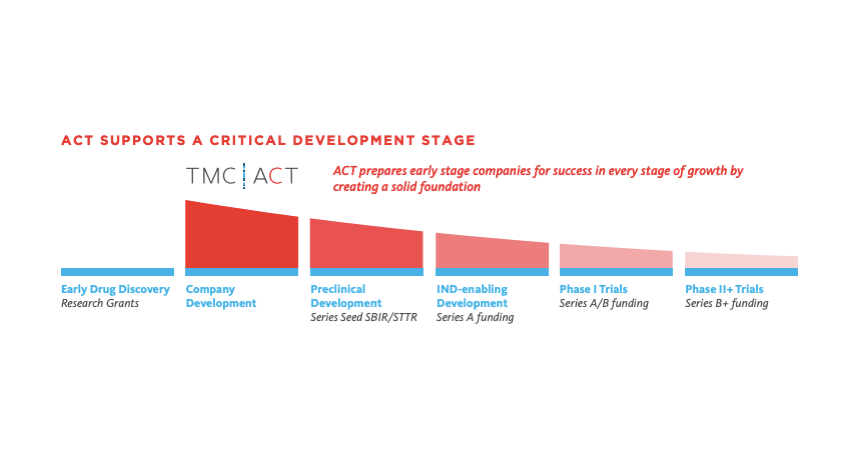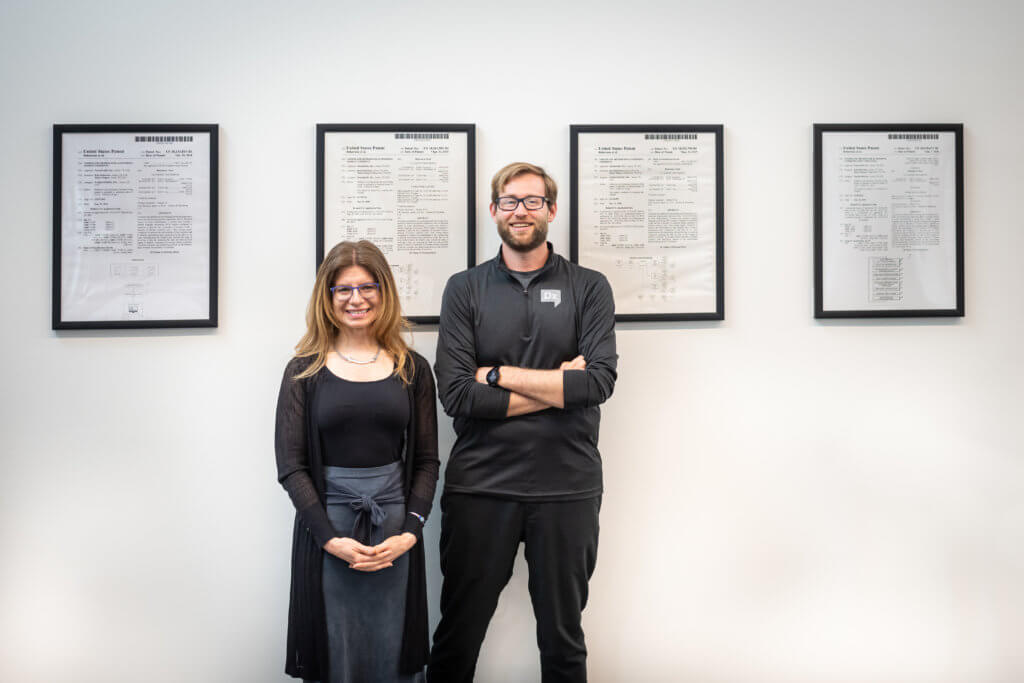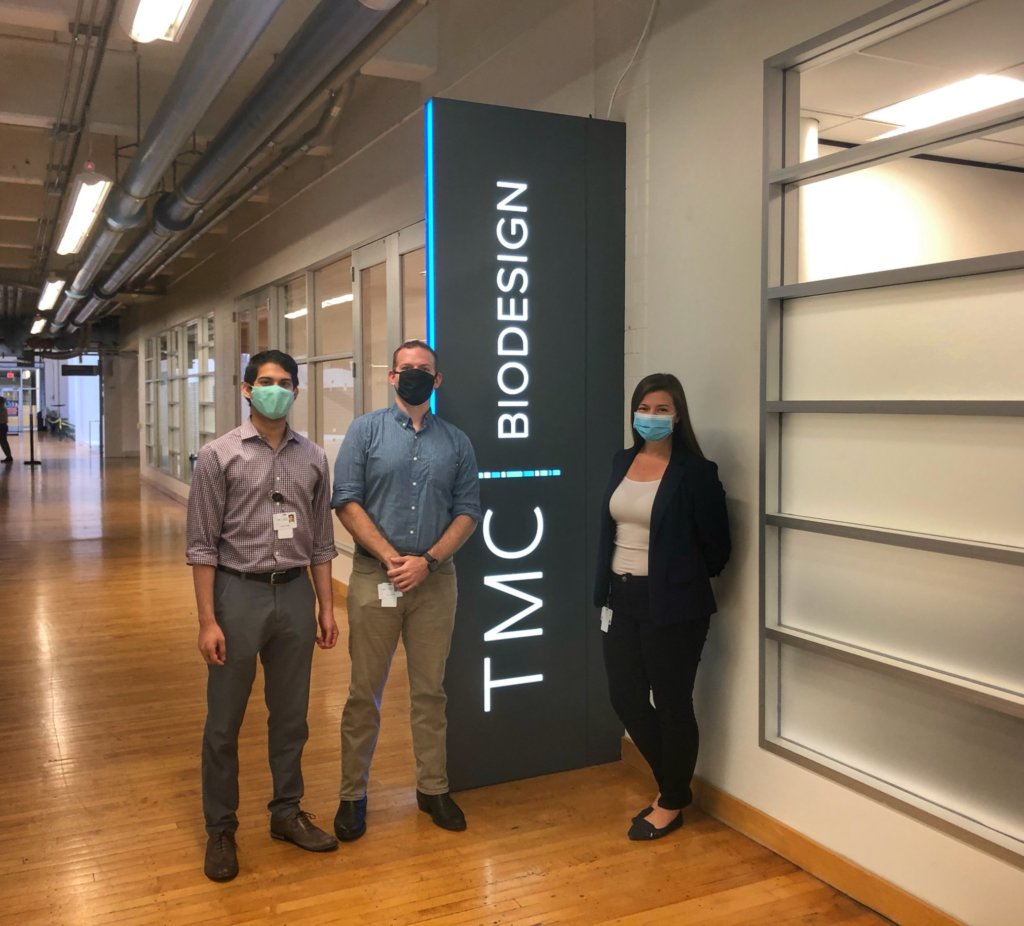TMCx shares lessons learned from first medical device program at Demo Day

The stage is set and the fancy chairs set out to welcome about 300 people to the TMC Innovation Institute on Thursday, to watch the inaugural TMCx accelerator medical device class give their last pitch at Demo Day.
Since forming their companies, the nine startups have gone on to raise a combined $9 million in funding, built 28 prototypes, had 65 engagements with advisors and clinicians and 30 engagements with customers.
But even with all of that knowledge and experience, they learned some lessons during their three months at TMCx. The accelerator staff did, too.
“Each of these companies came into the program at different stages of their lifecycle, and so while we have a set program and curriculum, it was important to interact one-on-one with them to understand their specific needs, and to try to bring them appropriate resources and expertise,” said Erik Halvorsen, Ph.D., director of the TMC Innovation Institute. “It isn’t a one size fits all program, and that is something I have learned in both this and our previous digital health cohort.”
The medical device program began with 11 companies, but two of the companies didn’t make it though the program, Halvorsen said. One left due to lack of funding. The other company completed two-thirds of the program, but realized there wasn’t enough of a value proposition for the product they were proposing, he added.
“While that was surprising, it demonstrated that the program that we run them through, and the way we have them thinking about their company and their product market fits, works,” Halvorsen said. “On a more positive note, we always anticipate companies are going to leave here further along than when they arrived, and I would say all of them have far exceeded my expectations. That is a testament to both the entrepreneurs and their teams, as well as to our program and the team at TMCx.”
Can’t see Demo Day in person? Join the live stream!
Meanwhile, the companies also shared some lessons they learned:
Albert Huang, M.D., CEO Allotrope Medical: “Understanding what it takes to build a medical device company. Not having that kind of background, everything was a true crash course on how to get an idea into something you can interface with investors. The biggest change of mindset would be how do investors look at technology. It takes a lot of resources, time and money to take something market, and everyone along the way needs to get something out of it.”
Catherine Liao, CEO, Blumio: “We are a Silicon Valley technology company and we don’t come from a medical device background. An early question was to understand the go-to market pathway from a clinical perspective. Time spent at TMC allowed us to really affirm our strategy of going to consumers first. We were also surprised at how skeptical investors were about whether consumers would buy this product. There is a perspective that consumers don’t care about their health, and therefore would not spend their money on something like this. That is something we are looking to challenge and prove them wrong.”
Jonathan Gunn, CEO, Briteseed: “One of the important lessons was understanding what a long process it is to bring a technology into a hospital or clinic. The more thoughtful you are about developing a strong business plan early on can help you avoid pitfalls.”
Kim Neely, chief designer, Flexios LLC: “Giving presentations. You always hear people say it is no big deal, just practice a lot. … But actually having to do that for Demo Day and beyond, for strategic advisory sessions and the expert forum, it has been helpful. … Another is education about the medical industry, particularly about all of the regulation surrounding medical devices. We knew they were special and that the government cared about keeping people safe, but actually going to the titles and subchapters and learning what is required to produce, manufacture and continue to maintain a medical device company is big.”
Jessica Traver, CEO, IntuiTap Medical: “One of the major things we worked on is our reimbursement strategy, and that is a challenging and tough topic. … No matter how much you plan or what you think you know, there are a million things that pop up. Having mentors here with expertise has been very helpful.”
Craig Davis, CEO, NovaScan: “I think you are forced, in a positive way, into a situation with other aspiring entrepreneurs that forms an ecosystem. … Also what was new for me was gaining an entrepreneur medical network in Houston. I am looking forward to keeping in touch with people here and down the road.”
Caroline Negly, business development, and Delores Calderon, business manager, Otricath: “As a newly formed business, it helped us put the puzzle pieces together of what we needed, and the check boxes we needed to move forward. We also learned who we needed to have as our strategic partners.”
Alan Glowczwski, M.D., CEO, and April Lovelady, Ph.D., chief technology officer, Voyager Biomedical Inc.: “This program helped us show we had value. In the beginning, you try to get anyone to help you out. Then, as we worked this program, we learned our idea has value, and our team has value. That parlays into having to be selective in your board and strategic advisory board to make sure they are engaged in helping you.”
Ernesto Rodríguez Leal, CEO, WeaRobot: “We learned it would take a huge investment to get our device into the medical side, but we found that we could go to market straight ahead in the serious gaming industry. That would help us with revenue to pursue the medical device pathway. We also learned how to be open to change, but not look away from our objective or purpose. We want to have our product be used for medical devices, but we were open to using it first with other applications.”




